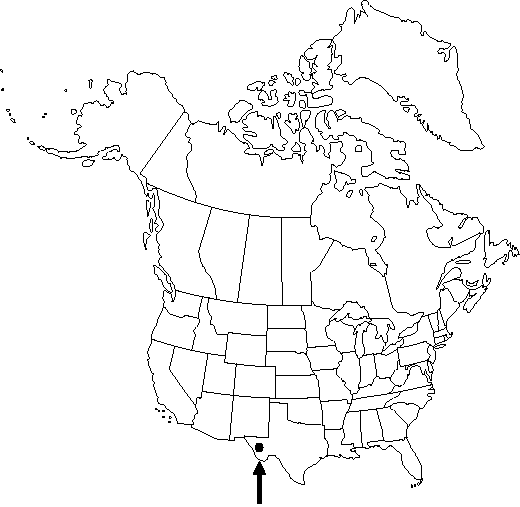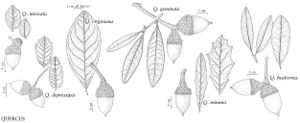Difference between revisions of "Quercus depressipes"
Mem. Natl. Acad. Sci. 20: 90. 1924.
imported>Volume Importer |
imported>Volume Importer |
||
| Line 55: | Line 55: | ||
|publication year=1924 | |publication year=1924 | ||
|special status=Illustrated | |special status=Illustrated | ||
| − | |source xml=https:// | + | |source xml=https://bitbucket.org/aafc-mbb/fna-data-curation/src/2e0870ddd59836b60bcf96646a41e87ea5a5943a/coarse_grained_fna_xml/V3/V3_880.xml |
|genus=Quercus | |genus=Quercus | ||
|section=Quercus sect. Quercus | |section=Quercus sect. Quercus | ||
Latest revision as of 21:52, 5 November 2020
Shrubs, evergreen or subevergreen, low, to 1 m, often forming dense thickets, rhizomatous. Bark gray, scaly. Twigs tan-brown, becoming reddish gray, 1-1.5 mm diam., glabrate or hairy. Buds tan or brown, subglobose, 1-1.5 mm, glabrate or scales inconspicuously ciliate. Leaves: petiole 1-2 mm, rarely longer. Leaf blade oblong to elliptic, 10-25(-60) × 8-25 mm, thick, leathery, base moderately to deeply cordate, petiole strongly depressed in basal sinus, margins inconspicuously toothed in distal 1/2, rarely entire, sometimes sublobate, somewhat revolute, secondary veins 5 or 6 on each side with few intermediates, branching, apex broadly rounded to subacute; surfaces abaxially dull gray-green or glaucous, completely glabrous or with a few stellate hairs on midrib, adaxially similar to abaxial surface, secondary veins somewhat raised on both surfaces. Acorns paired on peduncle 7-15 mm; cup 4-7 mm deep × 8-13 mm wide, goblet-shaped, enclosing 1/4-1/2 nut, base somewhat constricted or rounded, scales moderately tuberculate, proximally densely gray-tomentose, tips rather closely appressed, reddish brown, abaxially glabrous, ciliate; nut tan-brown, elliptic to ovoid or globose, to 10-15 × 10-11 mm, apex rounded, glabrous. Cotyledons connate.
Phenology: Flowering spring.
Habitat: Grassland and open wooded slopes
Elevation: 2100-2600 m
Distribution

Tex., Mexico (Chihuahua, Durango, and Zacatecas).
Discussion
Quercus depressipes enters the United States in only one population on the highest portion of Mt. Livermore in trans-Pecos Texas; it has a wider distribution in the dry altiplano of northern Mexico. Its most distinctive characteristics are the combination of dwarf clonal habit, small glaucous leaves without spinose teeth, and connate cotyledons. In northern Mexico, it hybridizes locally with Q. rugosa.
Selected References
None.
